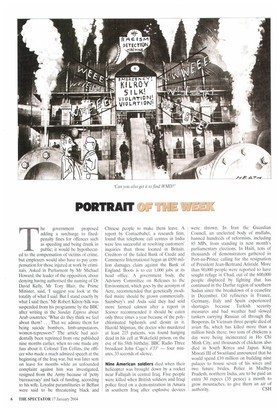T he government proposed adding a surcharge to fixedpenalty fines for
offences such as speeding and being drunk in public; it would be hypothecated to the compensation of victims of crime, but employers would also have to pay compensation for those injured at work by criminals. Asked in Parliament by Mr Michael Howard, the leader of the opposition, about denying having authorised the naming of Dr David Kelly, Mr Tony Blair, the Prime Minister, said, 'I suggest you look at the totality of what I said. But I stand exactly by what I said then.' Mr Robert Kilroy-Silk was suspended from his programme by the BBC after writing in the Sunday Express about Arab countries: 'What do they think we feel about them? . . . That we admire them for being suicide bombers, limb-amputators, women-repressors?' The article had accidentally been reprinted from one published nine months earlier, when no one made any fuss about it. Colonel Tim Collins, the officer who made a much admired speech at the beginning of the Iraq war, but was later sent on leave for months while an unfounded complaint against him was investigated, resigned from the Army because of `petty bureaucracy' and lack of funding, according to his wife. Loyalist paramilitaries in Belfast were said to be threatening black and
Chinese people to make them leave. A report by Contactbabel, a research firm, found that telephone call centres in India were less successful at resolving customers' inquiries than those located in Britain. Creditors of the failed Bank of Credit and Commerce International began an £850 million damages claim against the Bank of England. Boots is to cut 1,000 jobs at its head office. A government body, the Advisory Committee on Releases to the Environment, which goes by the acronym of Acre, recommended that genetically modified maize should be grown commercially. Sainsbury's and Asda said they had sold more farmed salmon after a report in Science recommended it should be eaten only three times a year because of the polychlorinated biphenyls and dioxin in it. Harold Shipman, the doctor who murdered at least 215 patients, was found hanging dead in his cell at Wakefield prison, on the eve of his 58th birthday. BBC Radio Three broadcast John Cage's 4'33" — four minutes, 33 seconds of silence.
Nine American soldiers died when their helicopter was brought down by a rocket near Fallujah in central Iraq. Five people were killed when British soldiers and Iraqi police fired on a demonstration in Amara in southern Iraq after explosive devices
were thrown. In Iran the Guardian Council, an unelected body of mullahs, banned hundreds of reformists, including 85 MPs, from standing in next month's parliamentary elections. In Haiti, tens of thousands of demonstrators gathered in Port-au-Prince calling for the resignation of President Jean-Bertrand Aristide. More than 90,000 people were reported to have sought refuge in Chad, out of the 600,000 people displaced by fighting that has continued in the Darfur region of southern Sudan since the breakdown of a ceasefire in December. Oil refineries in France, Germany, Italy and Spain experienced shortages because Turkish security measures and bad weather had slowed tankers carrying Russian oil through the Bosporus. In Vietnam three people died of avian flu, which has killed more than a million birds there; two tons of chickens a day were being incinerated in Ho Chi Minh City, and thousands of chickens also died in South Korea and Japan. King Mswati III of Swaziland announced that he would spend £10 million on building nine palaces to house seven of his wives and two future brides. Police in Madhya Pradesh, northern India, are to be paid an extra 30 rupees (35 pence) a month to grow moustaches, to give them an air of authority. CSH


































































 Previous page
Previous page